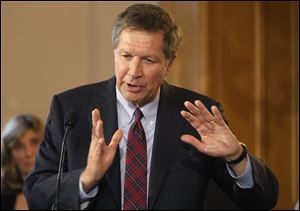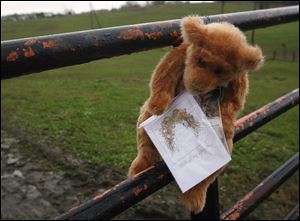
Kasich signs emergency order in response to Zanesville animal killings
10/21/2011
Ohio Gov. John Kasich answers questions during a news conference after he signed an executive order on dangerous exotic pets.
associated press

Ohio Gov. John Kasich answers questions during a news conference after he signed an executive order on dangerous exotic pets.
Gov. John Kasich signed an emergency order Friday in response to the exotic animal tragedy near Zanesville earlier this week, but animal welfare advocates say it does little more than restate existing laws.
The executive order instructs state agencies to use what the Kasich administration calls “existing but underused legal powers” to address public concern following the killing of nearly 50 exotic animals — including tigers, lions, and bears — after the owner of a private animal park near Zanesville released them and then killed himself.
But the executive order stops short of banning the sale and acquisition of such animals. The governor said during a news conference in Columbus that he doesn’t believe the state has the authority to enact such a ban, despite the fact that his predecessor, former Democratic Gov. Ted Strickland, did just that. Gov. Kasich let that ban expire in April. It contained a provision that would have prevented those convicted of animal cruelty — as the owner of the Zanesville animal park had been in 2005 — from owning exotic and dangerous animals.
The governor said he’ll wait for a working group he established several months ago to propose a legislative solution. He expects the group to finish its work by Nov. 30.
But animal welfare activists, including the president of the Humane Society of the United States, said the executive order doesn’t go far enough. They’re concerned that the working group — which includes the Ohio Association of Animal Owners, or OAAO — will opt to regulate rather than ban new ownership of dangerous animals. The OAAO’s members include monkey breeders, so-called “private zoo” owners, and the Mt. Hope Auction, which holds exotic animal sales every year.

A stuffed animal with a sympathy card attached hangs from the locked gate at the Muskingum County Animal Farm Thursday in Zanesville, Ohio.
Gov. Kasich said the operators of the auction have agreed temporarily not to sell such animals.
The new executive order encourages state agencies to work with county humane societies, which have had the power to enforce animal cruelty laws for nearly 50 years. It also says the Ohio Department of Natural Resources will review existing wild animal permits, but those only apply to native Ohio species such as brown bears — not lions, tigers, apes or grizzly bears.
The state will also set up a hot line to identify potential problem locations where dangerous wild animals are kept.
The executive order will help state and local agencies to be “innovative and creative in using existing authority,” Gov. Kasich said.
Joining him at the signing were the directors of the Ohio Department of Natural Resources and the Ohio Department of Agriculture, and the wife of celebrity wildlife expert Jack Hanna, who was at an event in Texas to raise money for conservation.
Wayne Pacelle, president and CEO of the Humane Society of the United States, said the executive order was a step in the right direction, but falls far short of the strong and immediate response needed. Ohio is one of only seven states that doesn’t regulate ownership of dangerous exotic animals and has one of the highest numbers of injuries from such animals.
“We are concerned it’s inadequate and far too conservative given the severity of the crisis,” he said. “We think he has clear authority to take action, to protect people of the state of Ohio.”
A Humane Society attorney, Jonathan Lovvorn, pointed out that the Kasich administration has yet to cite any specific provision of Ohio code or case law that would prevent him from immediately enacting a ban. Mr. Lovvorn also highlighted the fact that no one challenged former Gov. Strickland’s emergency order during the 90 days it was in effect.
Tim Harrison, a retired police officer and director of Outreach for Animals in Dayton, called the executive order “absolutely toothless.”
“It’s like putting a Band-Aid on a bleeding artery,” he said.
Contact Tony Cook at: acook@theblade.com or 419-724-6065.